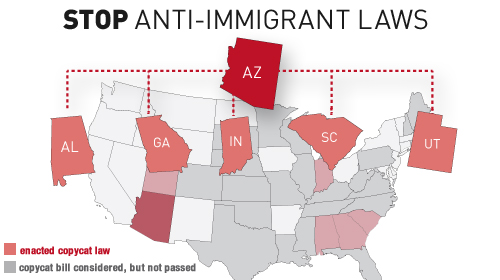
Today the Supreme Court heard arguments in one of the big cases of the term, . Several justices, including Justice Stephen Breyer, expressed serious concerns about the law's impact on civil liberties, as they recognized that it might lead to prolonged detention while an officer investigates a person's immigration status.
In response to those serious civil liberties concerns, Arizona was forced to retreat. Arizona was not defending S.B. 1070 as it was written by the state legislature, but rather an entirely different and fictional law that merely notifies the federal government that it has detained someone whose legal status it deems to be suspect.
But make no mistake: even that narrow reading of the law would result in a serious violation of the rights of citizens and lawfully present immigrants. As we heard in court today, there's no easy way for a citizen who happens not to have their ID on them to avoid being detained for an hour or more on the side of the road while an officer demands that they prove their right to be here.
Tellingly, Arizona did not step up to defend what the state legislature actually did in S.B. 1070. The law, on its face, implements an Arizona state immigration enforcement policy of zero tolerance and maximum harshness. But the federal immigration law that Congress passed recognizes that immigration status is actually far more complicated under federal law. Under federal law, the executive branch can permit someone who is applying for asylum, or seeking other kinds of legal status, to stay in the U.S. while their status is decided. But under Arizona law, they are subject to detention and criminal prosecution, and they take that risk every time they leave their homes and venture out onto Arizona's streets.
Chief Justice John Roberts asked today whether Arizona v. United States is a case about racial profiling. And although the federal government lawsuit is about the limits on state power, racial profiling is a central issue in the case, as chief law enforcement officials around the country have stated. It's simply impossible to enforce laws like S.B. 1070 without relying on false and illegal stereotypes. And because that's true, U.S. citizens and lawful immigrants are caught in the dragnet. Ultimately, it's not only up to the Supreme Court to decide if S.B. 1070 will stand. The American people must decide whether we will tolerate a nation with such invidious laws.
Learn more about anti-immigrant laws: Sign up for breaking news alerts, , and .

